- Home
- Deborah Wilson
Wounds of A Viscount: (The Valiant Love Regency Romance) (A Historical Romance Book)
Wounds of A Viscount: (The Valiant Love Regency Romance) (A Historical Romance Book) Read online
wounds of a viscount
THE VALIANT LOVE
REGENCY ROMANCE
a historical romance book
deborah wilson
Copyright and About the Author
Copyright © 2019 by Deborah Wilson
All Rights reserved.
In no way is it legal to reproduce, duplicate, or transmit any part of this book in any form or by any electronic means without written permission from the author. Recording of this book is strictly prohibited. Thank you for respecting the hard work of this author.
__________________
You can check out my full > > Amazon Book Catalog HERE.
I’d also like to invite you to connect with me on facebook or email. I love hearing from my readers and sharing my thoughts and writing progress.
[email protected] | facebook
__________________
Join Deborah’s Reader Club
Looking for obsessed alpha dukes, breathtaking romance and feisty lady?
Sign up now for Deborah’s VIP email list now.
Don’t Miss Out
Why?
Never miss a new release.
You will be notified by Deborah personally as soon as her next book is out.
Great books . Passionate romance . Zero Spams
Join Deborah’s mailing list now
__________________
>> Join Deborah’s Reader Club Here <<<br />
__________________
Table of Contents
Copyright and About the Author
Join Deborah’s Reader Club
About The Book
Prologue
0 1
0 2
0 3
0 4
0 5
0 6
0 7
0 8
0 9
1 0
1 1
1 2
1 3
1 4
1 5
1 6
1 7
1 8
1 9
2 0
2 1
2 2
2 3
2 4
2 5
2 6
2 7
2 8
2 9
3 0
3 1
3 2
3 3
3 4
3 5
3 6
3 7
3 8
3 9
4 0
4 1
4 2
4 3
4 4
4 5
4 6
4 7
4 8
5 0
5 1
5 2
5 3
5 4
5 5
5 6
5 7
5 8
5 9
6 0
epilogue
Keep Reading
Book List Order
Join Deborah’s Reader Club
Copyright and Disclaimer
About The Book
Selective Mutism is classified as an anxiety disorder. When stressed, a person can find speaking difficult and fall silent in public. Exclusion from social gatherings and other punishments have no effect on correcting the disorder. Yet with this disorder, the person maintains the ability to speak in general terms and can usually speak fluently at home and in private settings.
Forms of Sign Language have existed for as long as there have been deaf people. Around 1500, Europe began to develop different methods of signing. Manual language was widely used in Britain for public speaking for and from the deaf.
Part of George Dalgarno’s manual alphabet from 1680 is still used in England and New Zealand today.
For more information on Selective Mutism
Viana, A. G.; Beidel, D. C.; Rabian, B. (2009). Selective Mutism: A Review and Integration of the Last Fifteen Years. Clinical Psychology Review.
For more information on the History of Sign Language
Bauman, Dirksen (2008). Open Your Eyes: Deaf Studies Talking. University of Minnesota Press.
Dalgarno, George. Didascalocophus, or, The Deaf and Dumb Man’s Tutor. Oxford: Halton, (1680).
Liberties with both the disorder and sign language of the time have been taken to make this story more entertaining, so please enjoy.
prologue
* * *
London, England
March 1821
Lady Ebba Blanc walked into the drawing room. Her parents hastily jumped apart, an amusing combination of humor and guilt on their visages. Ebba’s mother, the Marchioness of Paxen, couldn’t manage to meet Ebba’s eyes. Her cheeks and lips were red, a telling sign that, had her parents not been married and been caught at a much youngster stage in life, whatever they’d been up to would have been scandalous indeed.
Lord Paxen cleared his throat and straightened just as his wife covered her mouth, cutting off a fit of giggles.
“Yes, my child,” her father said. “How can we help you?” He tried, very hard she was certain, to make his words firm and less whimsical.
Ebba pressed her lips together to hold back her own smile. It was no wonder she was odd. Her family was very odd indeed. As the seventh child of Lord and Lady Paxen, Ebba had often been overlooked, for a parent only had so much attention to give before it ran out. She’d had even less, because her parents were so deeply in love with one another. If they hadn’t been wealthy enough to afford the army of servants who saw to the house, Ebba and her siblings would have been forced to fend for themselves altogether.
“Perhaps, I should come back later,” Ebba offered.
Her mother giggled again, as though she were a girl of thirteen and not a woman of fifty-three.
Her father cleared his throat again. One more of those and Ebba would start to be concerned. “No, that’s quite all right, my dear.”
My child. My dear. Ebba often wondered if her father knew her name. There were days when he called her everything but Ebba, even going through her brothers’ names before reaching hers.
Ebba walked across the spacious pale blue and yellow drawing room before taking a seat across from her parents. Once she was in place, nervousness crowded its way into her blood and stole her breath. Her parents had distracted her from her earlier apprehension, but now that she had their attention…
“Ebba?” Her mother leaned forward. “What’s the matter?” Lady Emma, the Marchioness of Paxen, was not a classic beauty, but there was something appealing about her face. Her words held sweetness and ingenuity that all admired. Her father more than anyone else.
“Nothing’s wrong,” Ebba told her. “I simply wanted to talk to you both.”
Her parents shared a look and then they turned back to Ebba.
“What’s this about?” Lord Paxen shifted and suddenly all the flickers of humor left his gaze. Lord Alexander Blanc was a very handsome man and, as the story went, he’d been quite a rake before marrying Ebba’s mother. It had been a love match in every way. No one could break them apart. Not scandal. Not Lady Emma’s parents. Nothing.
And now, nearly thirty years later, they were still happy. Still head over heels in love.
Ebba was happy for them. All she wanted was her own happiness.
Unfortunately, her form of happiness went against the beau monde’s laws of what was and wasn’t socially acceptable for a young lady.
As if reading her mind, her father said, “This is about that theatre, isn’t it?”
Ebba felt her
eyes widen. One would think that after having seven children, there was no way for a father to know what his daughter was thinking. Yet Lord Paxen had always been sharp.
Ebba licked her lips. “I’ve been offered the part of Lady Macbeth.”
Her mother gasped.
Even her father looked amazed. Everyone knew what it meant to get such a part. Her father didn’t even enjoy the theatre. He would rather live his life than watch someone else act it out, yet he knew that only the best actress in London got to play Lady Macbeth. The part was usually reserved for more seasoned actresses, but sometimes, it was given to whoever deserved it most, and Ebba had worked very hard before going against what was expected of her and trying out for the part.
“How?” her father asked. “How did you…?”
Ebba moved to the edge of her seat. “Papa, I’ve never wanted anything more than this. You know that. Neither a husband nor children would satisfy me.”
Her mother gasped again, but this time for a new reason. Ebba’s words were all but blasphemous to her mother, yet she’d said them before.
“I adore you both,” Ebba said. “I see the love between you. That is how I feel when I am on stage. I know you don’t understand it, but it’s true. Marriage is not for me. It has never been for me.”
Her father stood and began to pace. “Ebba, you can’t be Lady Macbeth.”
Thankfully, she was seated when he spoke. Otherwise, she’d have fainted. Her lips trembled. “Papa, please.”
“Alex,” her mother chided.
He turned to his wife swiftly and then returned to her side as though led by an invisible leash.
Yes, their love was exactly how she felt about the theatre. She loved the silence before the auditorium filled. She liked the way it brought people together. She loved the way scenes moved people, pulling emotions from the depths of souls, causing weeping and anguish or happiness and laughter.
Ebba looked at her parents and found them watching her silently.
Her father narrowed his eyes but then smiled softly. “I believe I had that far-off look in my eyes when I first saw you.” He was speaking to wife.
“You did.” Lady Emma sighed and took her husband’s hand. “We’ve been very blessed.”
Very blessed indeed. Thirty years. Seven children, a war, and not one of them was dead. Ebba’s second brother, Noah, had fought against Napoleon and had returned a hero.
For the most part, all of their children were successful in their own ways. Ebba’s elder sisters had married very well and were happy with their matches, as were all her brothers except Noah.
Only Ebba and Noah had yet to wed.
“You’ve had over a dozen suitors,” her father said. “You didn’t wish to marry any of them?” Lord Paxen would never force his children to marry someone they didn’t choose on their own. Every child who’d wed had married for love.
“No,” Ebba said. “I don’t wish to marry.”
“Perhaps, you’ve yet to find the one,” her mother said. “The one who will sweep you off your feet.” She threw her hands in the air as though she were being swept away onto a ballroom floor.
Her father turned and looked ready to take advantage of his wife’s open arms— ever the rake where his Lady Paxen was concerned— but a glance in Ebba’s direction reminded her that she’d interrupted whatever they’d been up to.
“Perhaps, you’re right,” her father said, speaking to his wife once again. “Perhaps, Ebba has yet to meet the right man.” He took her hand once more. “Were it not for cousin Buford, we’d have never met.”
Sadness crept into her mother’s eyes. “Buford. Yes.”
Lord Buford Amdon, the former Viscount of Coalwater, was gone, had been for many years, but whenever his name was mentioned in their home, it was always done with reverence.
Ebba remembered her cousin but didn’t like to think about him, because thoughts of Buford always led to—
“Garrick,” her mother whispered with anguish. “Poor boy.”
Garrick Amdon was Buford’s son and the current Viscount of Coalwater.
He was also far from a boy, though her mother often referred to him as one.
If the rumors were correct, Garrick had turned a brothel in Covent Garden into his personal harem.
Garrick was, in fact, twenty-four, but eight years ago, something terrible had happened to him. He’d been kidnapped at sixteen and held captive for four years. Since Coalwater had always had trouble speaking, Ebba wasn’t sure anyone knew the full story of his experience.
He’d been a broken man upon his return. Ebba’s father had stepped in and tried to be the father Garrick had lost, but Garrick had preferred the company of lightskirts and so Lord Paxen had left him to his own devices, claiming that one day Garrick would meet the woman who would understand him and love him.
Love was Lord Paxen’s answer to everything.
Yet four years later, not much had changed. All the men responsible for her cousin’s capture had been locked away, but Coalwater only emerged from the brothel when his friends, the other men who’d been kidnapped, beckoned him to join them for some special occasion.
Ebba knew them all. The Duke of Astlen, the Marquess of Fawley, the Marquess of Denhallow, and the Earl of Ganden. Ebba also knew their wives. Only Coalwater and Fawley had yet to attach themselves to anyone.
“No one deserves love more than Garrick,” Lord Paxen said.
“Then how about we trade,” Ebba mocked. “He can marry, and I can take his freedom to do as I please.”
She hadn’t meant the words. Such things were not possible. One couldn’t trade lives with another. A woman could never have what a man could simply if he went after it.
Yet… Ebba noticed her father was looking at her differently and then, slowly, a rakish smile bloomed upon his face.
“All right, Ebba.” Her father turned to her, still holding his wife’s hand. “A trade then. You find Garrick a wife, someone who loves him, and I’ll let you be Lady Macbeth.”
Her mother did what she always did. Gasp. She was easily surprised.
But Ebba was amazed. “You want me to find Garrick a wife?”
Her father nodded. “You accomplish that, and I’ll let you perform at the theatre for this one part. Of course, one of your sisters will have to act as your chaperone, maybe Noah as well. We can take measures to ensure your reputation if need be.”
Ebba smiled. She knew hordes of ladies, many who would love to marry her cousin, a viscount, a wealthy gentleman who was very handsome. It wouldn’t even bother them too greatly that he chose not to speak. The ladies in her circle, except for a limited few, always did whatever she told them to do.
Her father, clearly knowing where Ebba’s thoughts were going, pointed a finger at her. “It has to be love, Ebba.” Not only was his voice hard, but there was a threat in his eyes. “They must marry for love and no other reason. Then, and only then, will I allow you to play Lady Macbeth.”
Love?
How was she to manipulate a lady into falling for a man who couldn’t speak? Her father might as well have said she couldn’t play Lady Macbeth, because, in the end, that would be the result.
“What if she really likes him?” Ebba asked.
Her father shook his head and stood. “Love, my dear. There’s no replacing it.”
Ebba sighed and stood. She had absolutely no faith that she could accomplish this task. She wasn’t even sure if Coalwater wished to wed.
“So, do we have a deal?’ Lord Paxen asked, anxiously. There was hope in his eyes. Did he really think Ebba could accomplish what he’d failed to do over and over again for the last four years?
He stood, took her chin his hand, and asked, “Was my daughter offered the part of Lady Macbeth by her talents and her own tenacity or not?”
Ebba smiled. Even if she never played the part, it was an accomplishment to have won the part. “Yes, I was.”
“Then, I believe you capable of doing anything.” He kisse
d her hair and then turned her around. “Now, out. Leave your mother and me alone.”
“Yes, Papa.” Ebba smiled as she left the room and closed the door behind her. She didn’t even bother to look back. The giggling started before the door clicked.
∫ ∫ ∫
0 1
* * *
Lady Honora Baxter tried to keep as close as possible to the lights the Covent Garden plaza offered, yet far enough to not draw attention. Nora had dressed in her mourning garment. It was the only costume she had that was sure to help her blend into the night. Taking back streets, she rushed through the pungent alleyways.
The cold could only mute the stench so far. She buried her nose in her cloak and pressed on.
She kept her head and her skirts up and tried to ignore the scurrying noises of small feet scraping against brick.
This was not her first journey out into London far past the hour of midnight, but it was the first time she’d gone here. She listened to the laughter and the shouts to a passing hackney. The clips of horse hooves assured her that if trouble found her on her path, enough trouble to force her to scream, she could easily be rescued.
But she prayed her journey would be completed without fuss. She needed to be home before anyone knew she’d left. She was glad her daughter no longer needed her at night. Miriam, who was ten, now slept in her own room in Lord and Lady Ganden’s home. Nora had been working for the earl and countess for almost two years. She was their nephew George’s governess. George was a beautiful boy with a wonderful spirit, but at eleven, he’d already decided it was time for him to be like other boys his age and go off to school.
When talk had begun about George attending Eton, Nora had feared she’d be dismissed, but then Lady Ganden, who she’d been invited to call by her given name Lucy, had asked Nora to remain as her companion.
The woman was a true blessing. The countess would never understand the heart of Nora’s happiness. Lucy thought Nora needed money, which was not the case at all. In fact, Nora’s husband had left her a wealthy woman. What Nora needed from Lord and Lady Ganden was something different.
Something more valuable than money.

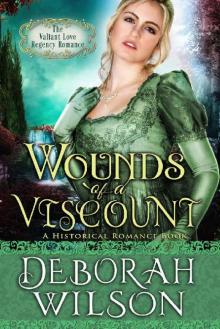 Wounds of A Viscount: (The Valiant Love Regency Romance) (A Historical Romance Book)
Wounds of A Viscount: (The Valiant Love Regency Romance) (A Historical Romance Book)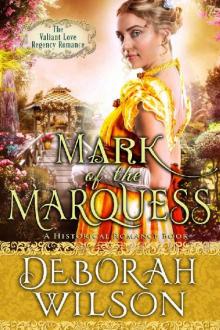 Mark of The Marquess (The Valiant Love Regency Romance) (A Historical Romance Book)
Mark of The Marquess (The Valiant Love Regency Romance) (A Historical Romance Book)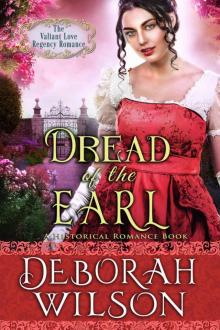 Dread of The Earl (The Valiant Love Regency Romance) (A Historical Romance Book)
Dread of The Earl (The Valiant Love Regency Romance) (A Historical Romance Book)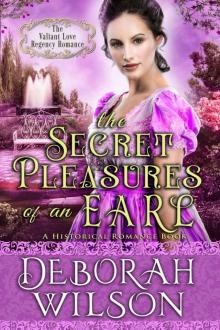 The Secret Pleasures of an Earl: (The Valiant Love Regency Romance) (A Historical Romance Book)
The Secret Pleasures of an Earl: (The Valiant Love Regency Romance) (A Historical Romance Book)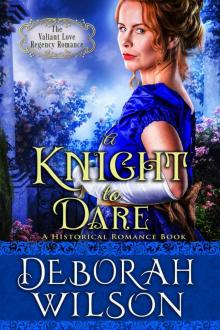 A Knight to Dare: (The Valiant Love Regency Romance) (A Historical Romance Book)
A Knight to Dare: (The Valiant Love Regency Romance) (A Historical Romance Book)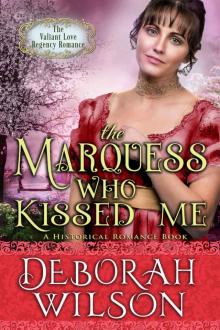 The Marquess Who Kissed Me: (The Valiant Love Regency Romance) (A Historical Romance Book)
The Marquess Who Kissed Me: (The Valiant Love Regency Romance) (A Historical Romance Book)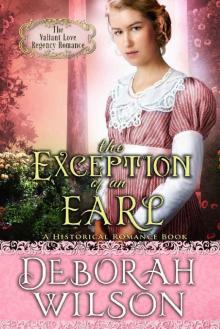 The Exception of an Earl
The Exception of an Earl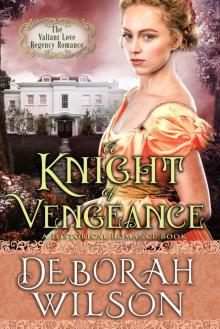 A Knight of Vengeance: (The Valiant Love Regency Romance) (A Historical Romance Book)
A Knight of Vengeance: (The Valiant Love Regency Romance) (A Historical Romance Book)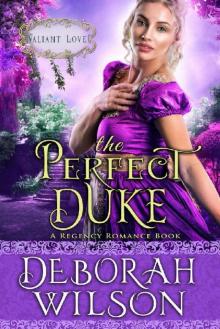 The Perfect Duke (Valiant Love) (A Regency Romance Book)
The Perfect Duke (Valiant Love) (A Regency Romance Book)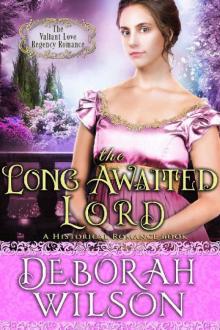 The Long Awaited Lord
The Long Awaited Lord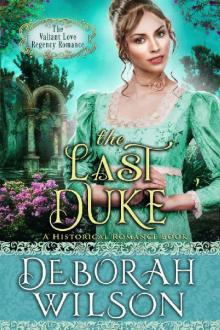 The Last Duke (The Valiant Love Regency Romance) (A Historical Romance Book)
The Last Duke (The Valiant Love Regency Romance) (A Historical Romance Book)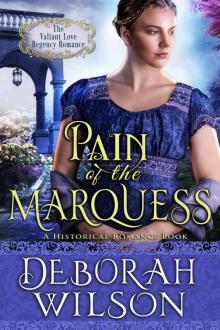 Pain of The Marquess: (The Valiant Love Regency Romance) (A Historical Romance Book)
Pain of The Marquess: (The Valiant Love Regency Romance) (A Historical Romance Book)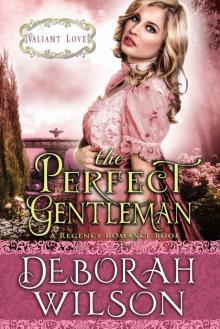 The Perfect Gentleman (Valiant Love) (A Regency Romance Book)
The Perfect Gentleman (Valiant Love) (A Regency Romance Book)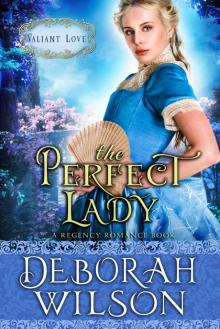 The Perfect Lady (Valiant Love) (A Regency Romance Book)
The Perfect Lady (Valiant Love) (A Regency Romance Book)